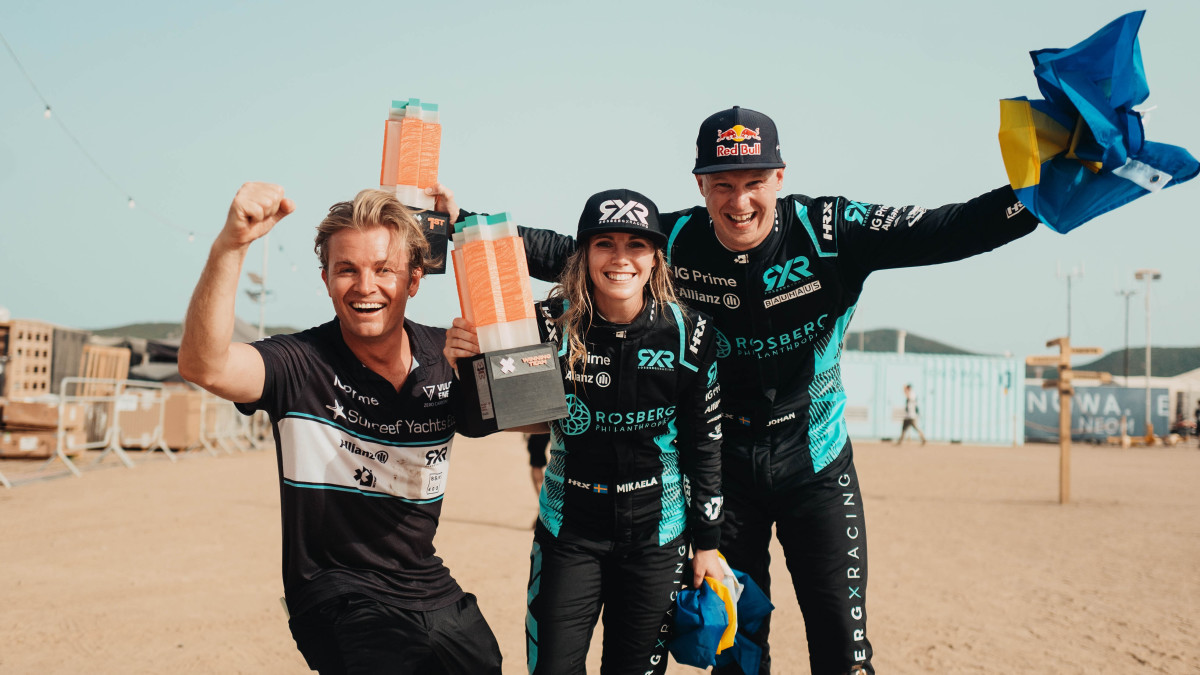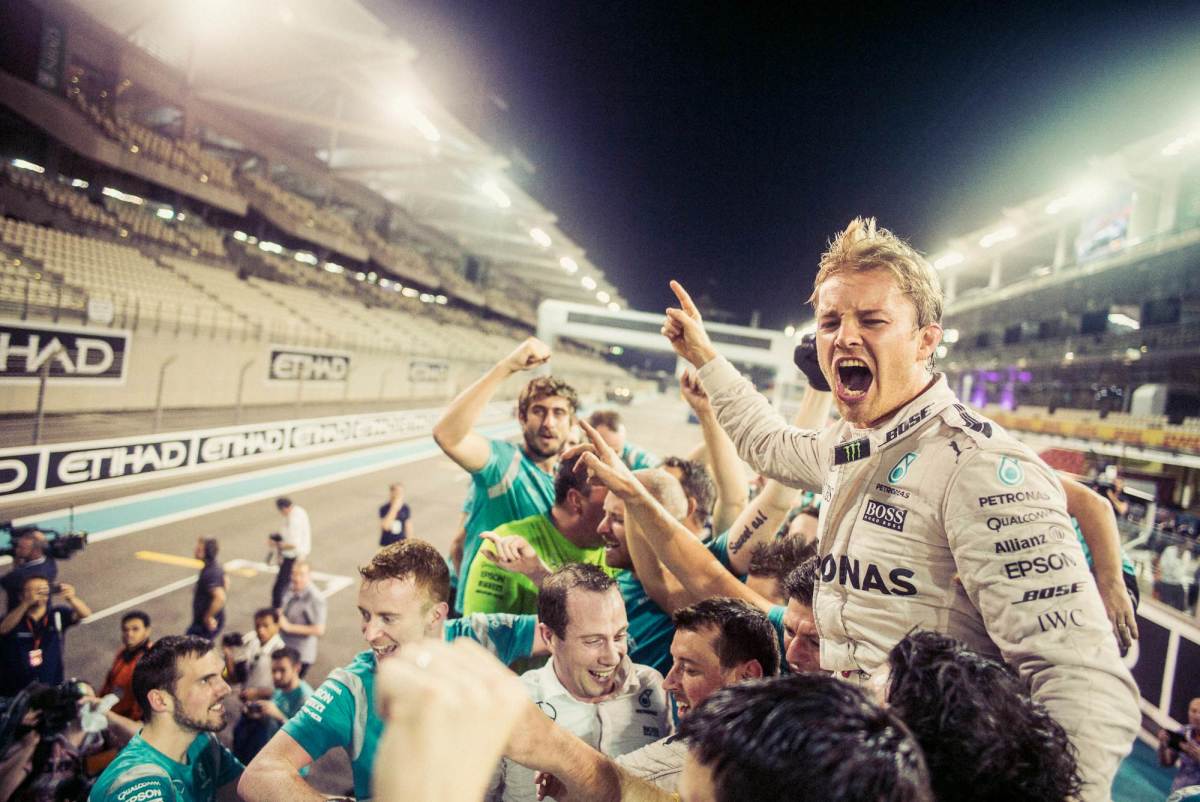Even in Retirement, Nico Rosberg Is Never Far From Racing
Nico Rosberg has always had racing around him. His father, Keke, was the 1982 Formula One World Champion who later founded Team Rosberg, an organization that saw the Rosberg name race in touring cars and single seaters across Europe. Now, decades later, Nico has almost replicated his father’s successes with his own F1 World Championship in 2016 and a race team—but he’s set on doing things his way.
Rosberg X Racing is an evolution of Team Rosberg, but focuses on electric motorsport and more specifically the Extreme E series. Finding success in the off-road championship that races in the most remote parts of the world, Rosberg X Racing won the inaugural Teams’ Championship in 2021, and came a close second last season. Next month in Chile, the team will try again to achieve the championship crown during the highly-anticipated Copper X-Prix.
Ahead of the season finale, both for Extreme E and F1 in Abu Dhabi, Rosberg sat down with Sports Illustrated to talk about his shocking F1 retirement, managing his own racing team and the crazy opportunities he was offered when he hung up the helmet.

Sports Illustrated: Nico, did you always want to have your own motorsport team?
Nico Rosberg: Yeah, so it was not necessarily always the dream. I grew up watching my dad have a racing team, he drove in the Touring Car Championship. So I always found that very interesting. It just evolved naturally. When you're a racing driver, the next step can be to have your own team. I would have liked to do it in Formula E (an electric single seater championship), but it's just too big of a commitment and financially very challenging, so that didn't work out. I invested in the championship instead. Then the Extreme E opportunity came up and it just fit perfectly.
SI: How much advice did your dad give you when starting a racing team?
NR: Well, in general, it's not that easy, a father-son relationship with advice giving. I'm also a bit stubborn when it comes to advice. So, he didn't really give me much advice at all. But of course, it's his team that he found, Team Rosberg, who is supporting my racing team with the operations. And so we're very much interlinked there, which has been a nice collaboration.
SI: What has it been like managing a race team?
NR: It's been an adventure. Managing the drivers has been the most interesting because now I'm on the other side. You really need to be delicate, like you cannot from the outside tell them what to do. You need to help them to find their own improvements and find their own progress, and kind of point them in the right direction. In the beginning, I went in a little bit too hard because I knew so much that I could straightaway help them with, but me coming in and just saying “you should do that” didn’t really work.
SI: Extreme E is championing both equality and sustainability. For example, each team has to have both a woman and a man as their driver line-up, with your two drivers being Johan Kristoffersson and Mikaela Åhlin-Kottulinsky. How important are those two things for you?
NR: Well, that's the reason why I'm racing in Extreme E, because of the social causes. We're raising awareness and helping combat climate change with what we're doing. We're really raising awareness and actually implementing measures for equality already. That's why every team has a man and a woman driver, which is absolutely unique in the world of motorsports. It's been working fantastically. I really think it's wonderful how we're using the platform of sports to be such advocates for social causes.
SI: How did you decide on your pairing of Johan and Mikaela?
NR: Because it's a new format, you don't know what's going to work. Is it going to be the track circuit racers or actually the full Dakar Rally racers. So, I did a lot of research, and I looked at the rally and I was actually looking at split times on the Global Rally database around the world just to try and understand which drivers were good. Then I just reached out. Mikaela, got the number from the paddock but Johan I reached out on Instagram via a direct message. At first he was like, “No, not interested,” and then I kept pushing and then he accepted.
SI: You mentioned investing in Formula E, and being a shareholder. What is it about Formula E, and electric motorsport in general that you’re so passionate about?
NR: I invested in Formula E in 2017. It's continuously progressing, opening to new cities with Tokyo coming, and they raced in India and South Africa, all these great places. The unique thing for me is that you go to the people because you race downtown, and make it much more accessible for families. It coexists with F1. It's not a rival, and it's been growing well. There are a lot of car manufacturers involved, the fan base is growing and the quality of drivers has been steadily on the rise. We’ve seen drivers go from Formula E to F1, even, and vice versa.

SI: After sealing the 2016 Drivers’ World Championship, you shocked the world by announcing your retirement from racing. Since then, you’ve kept one foot in the door thanks to efforts like your race team, as well as Rosberg Philanthropies and founding the Greentech Festival. What were some of the other offers you got off the back of announcing your retirement?
NR: So on the night of my retirement, I got offered to drive in Formula E for quite a lot of money. Actually the offer went to my wife, and then she told me. But anyways, that was an easy decline, because obviously, I just stopped racing and didn't want to get started again straight away. I was also going to be a coach at Germany's Next Top Model. I mean, there was a sense to it because it's all about mental performance and confidence and, and taking on the challenge and being brave, even for them. So on the one side it was strange, but on the other side, it was actually a good fit. But I didn't do it.
SI: You previously turned down a place at London University's Imperial College to study aeronautical engineering, as you decided to focus on racing. How has that engineering interest helped you in your career? I also read that you had the highest score on the Williams Racing engineering aptitude test when you joined F1.
NR: I really enjoyed physics and math and always try to understand the racing car, in depth, especially mechanically. In all my time, going through Formula Three, before the F1 days, so when I arrived at F1, I was just so knowledgeable about everything. That's why I was able to answer all these questions, I beat some of the engineers actually on it. So that was very cool. But that was definitely one of my strengths in my career. I always perfected every single little detail for marginal gains, also little details added up to become a big advantage. I always perfected every single detail I could and that's what I'm now taking into my sustainability and venture entrepreneur activities.
SI: What kind of things do you do in your downtime to relax? How does Nico Rosberg unwind?
NR: Lately it has been unwinding with the family. So last night, I was watching a Christmas movie with my wife, The Princess Switch? You have to make compromises sometimes for a happy marriage. So yeah, so I was watching that or a podcast, spending time with the kids. I love to play tennis.
SI: You used to enjoy cycling during your F1 career, but gave that up to save some weight. Have you been able to get back into that again?
NR: I didn't have to give it up, it was a choice. The leg muscles weigh more than half a kilo. So it's one of the heaviest parts, the performance leg muscles to be a good cyclist of course weigh more than your normal leg muscle. So I decided to get rid of them because every gram mattered when we were in F1 because we're overweight with the car and driver. That really helped me be faster just by being lighter. So that's why I stopped cycling. It was attention to detail, even my helmet was black because I removed the paint and saved 75 grams.
SI: How long did it take to find some kind of normality after leaving the world of F1?
NR: I’m still looking for it now. It’s still an exploration but of course life is much more relaxed, much more free. I can choose completely freely where I'm going and when I'm going. Being home so I never miss the kids' performances at school, birthdays are never missed. So that's nice.
